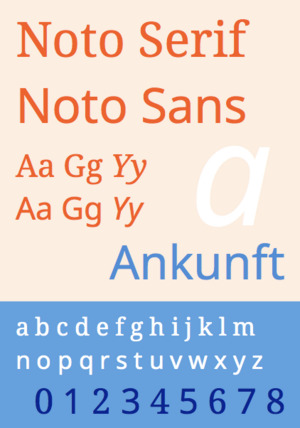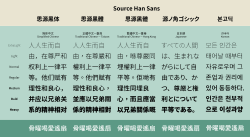Noto fonts facts for kids
 |
|
| Category | Sans-serif; serif; non-Latin |
|---|---|
| Classification | Humanist (sans-serif); transitional (serif); non-Latin |
| Commissioned by | |
| Date created | 2012–2020 |
| Date released | 2013 |
| License |
|
Noto is a special collection of computer fonts, like different styles of writing, that are all free to use. These fonts are designed to include almost every writing system in the world. This means Noto helps computers show text correctly, no matter the language.
As of late 2024, Noto can display text in about 1,000 languages and 162 different writing systems. It covers over 77,000 characters. The Noto family aims to make all these different languages look good together. For example, they try to make sure the letters have similar heights and line thicknesses. Google asked for these fonts to be made.
Contents
What is Noto?
Why Noto was Created
Have you ever seen little empty boxes or strange symbols when reading something online? These boxes, sometimes called "tofu," appear when your computer doesn't have the right font to show a character. It's like a placeholder for missing letters.
Google created Noto to get rid of these "tofu" boxes. The name "Noto" comes from "no tofu." It also comes from the Latin word noto, which means "I write" or "I note." This name shows Noto's goal: to help you write and read in every language.
How Noto Works
Noto Emoji
The Noto Emoji Project creates colorful and black-and-white emoji fonts. You might see these emojis on Google apps like Gmail and YouTube. They are also used on Android phones and ChromeOS computers.
Latin, Greek, and Cyrillic Scripts
Noto has different styles for common alphabets. Noto Sans and Noto Serif are two main styles. They include letters for Latin (like English), Greek, and Cyrillic (like Russian). These styles were designed by Steve Matteson.
East Asian Scripts (CJK)
Noto also has special fonts for East Asian languages. These are called Noto CJK fonts. "CJK" stands for Chinese, Japanese, and Korean. These fonts were made with help from Adobe. They include Chinese characters, hangul (Korean), and kana (Japanese).
What Noto Covers
As of late 2024, there are many Noto fonts. Most are sans-serif (meaning they don't have small lines at the ends of letters). Some are serif (they do have those lines).
Noto Color Emoji supports many emoji symbols. It works on Android devices and in web browsers like Google Chrome.
The Noto fonts cover 162 out of 168 writing systems defined in the Unicode 16.0 standard. Unicode is like a huge dictionary of all the characters used in writing around the world. Noto also includes many symbols and emojis that don't belong to a specific writing system.
Google's goal is for Noto to cover almost all characters in the Unicode standard. This helps make sure that text from any language can be shown correctly on computers and websites.
Using Noto Fonts
Many computer programs and operating systems use Noto fonts. For example, LibreOffice, a free office software, includes Noto fonts.
Since 2019, IKEA uses a special version of Noto Sans called Noto IKEA. It's their main font for everything they print and display. It replaced an older font called Verdana.
More to Explore
- Open-source Unicode typefaces
- Roboto, another font used on Android devices
See also
 In Spanish: Google Noto para niños
In Spanish: Google Noto para niños
 | Sharif Bey |
 | Hale Woodruff |
 | Richmond Barthé |
 | Purvis Young |








